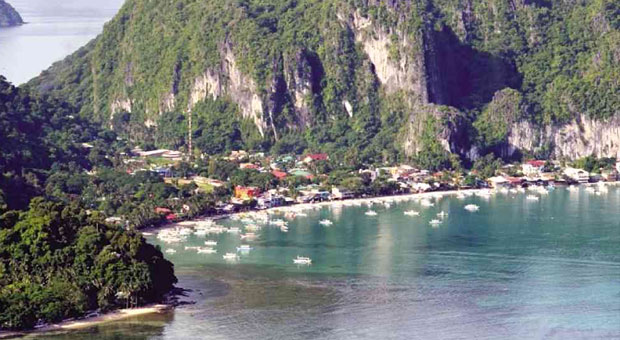El Nido seeking P259-M loan for sewage facility

THE EL NIDO shoreline won’t betray the town’s lack of sewage facilities. PHOTO FROM EL NIDO TOURISM OFFICE
PUERTO PRINCESA CITY, Philippines—The municipality of El Nido in Palawan has admitted dealing with a recurring problem of coliform contamination of its public beach because of the absence of a sewage treatment facility big enough for the entire town.
El Nido Mayor Edna Lim told Inquirer the town is negotiating a loan with the Development Bank of the Philippines (DBP) to finance the construction of a main water treatment facility that would service the tourist town.
She said the town is “in the final stages” of obtaining a P259-million loan from DBP.
Town officials said the facility would be set up in the town center to treat waste discharge from commercial establishments and residential units and prevent contamination of the beach.
Lim said ordinances had been passed to regulate the discharge of wastes into the sea. One such measure requires all commercial establishments to have waste water treatment facilities.
Article continues after this advertisementNereus Acosta, presidential adviser for environmental protection, drew attention to the pollution in the coastal beach of Bacuit Bay.
Article continues after this advertisementAcosta had warned officials that the pollution is threatening to set back tourism in the area.
Acosta said he found that waste water passing through storm drainage and pipes from houses and establishments is being discharged directly into the sea, causing coliform pollution and lowering water quality.
Joel Gomez, municipal information officer, said coliform contamination had affected only a portion of the public beach.
He said the town had passed a new land and water use plan that requires establishments on the beach in the town center to keep a distance of at least 20 meters from the high tide line.
Speaking before the Palawan Chamber of Commerce on the threats of climate change on Saturday, Acosta said results of recent tests on water samples in El Nido showed the popular beach resort town being contaminated with coliform, or organisms forming from human and animal wastes.
“The sewer lines from houses and establishments are directly emptying into the beach of El Nido. I was literally jumping over stench-filled canals,” Acosta said.
Tests on water samples from Bacuit Bay exceeded tolerable limits of pollutants, he added.
“BOD or biochemical oxygen demand is at levels 3,000 percent higher than what the Clean Air Act, which I principally authored in Congress, allowed,” said Acosta, a former representative of Bukidnon province.
The Philippine Water Code provides critical indicators of water quality, including measurements of dissolved oxygen in water important in the process of dissolving biological organisms in it.
The evident cause of beach pollution in El Nido, Acosta observed, is the absence of a proper drainage system in the municipality.
RELATED STORY